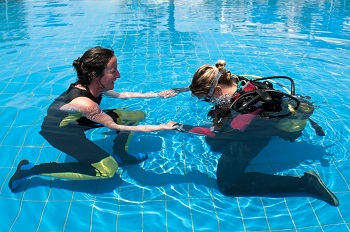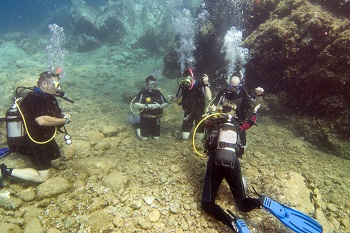In order to enjoy the many wonders and sights of the underwater world, recreational scuba divers need to become “certified.” The process, while not difficult, is very important to optimize diver comfort and ensure diver safety.
 There are many scuba diving training organizations and each has established a set of minimum standards that need to be met for a student to become “certified.”
There are many scuba diving training organizations and each has established a set of minimum standards that need to be met for a student to become “certified.”
Among these standards are an in depth knowledge and understanding of the diving process, how to use modern scuba diving equipment, and safe diving practices. The certification process, introduced as part of an Open Water Course, involves three main elements: basic knowledge and review, pool skills and equipment evaluation and open water training (or check-out) dives.
- Basic Knowledge Review: Whether done in a classroom setting or through an “eLearning” option, students learn about scuba diving during the academic portion of their training. This training may include demonstrations (video and/or in person), academic exercises, reading, and quizzes. The knowledge acquired during these academic exercises helps students become certified scuba divers.
- Pool Skills: You can’t become a diver without getting WET! Even if a student has completed the academic portion of their training online, they’ll still need to jump in the pool to become certified. These pool sessions typically include several sessions where you’ll learn things like how the equipment works, how to calmly and securely breathe underwater, and how to enjoy the scuba diving experience in a controlled environment.
- “Check-Out Dives”: The final part of your open water certification program is a series of open water dives with your instructor. During these dives, you will demonstrate your proficiency using the equipment, show your skills, and expand your experience in a “non-controlled” environment.
 Many people ask, “How long does it take to get certified?” The answer to that can be different for each individual diver. Most courses are “skills based,” meaning that once you master a skill, you move on to the next. Some students pick these skills up faster than others. As a rule, most courses can be completed in a few weeks depending on the schedule and number of sessions each week.
Many people ask, “How long does it take to get certified?” The answer to that can be different for each individual diver. Most courses are “skills based,” meaning that once you master a skill, you move on to the next. Some students pick these skills up faster than others. As a rule, most courses can be completed in a few weeks depending on the schedule and number of sessions each week.
Once you receive your Open Water certification, you are able to rent equipment and scuba dive anywhere in the world. You will receive a “C-Card” with your photo on it that becomes your license to dive. Your certification has no expiration, but it’s strongly recommended that you stay current and get in the water at least once a year.
Open Water certification is just the beginning. Many divers choose to take advanced courses following their initial certification. There are many options for different specialty courses including Advanced Open Water, Rescue Diver, Nitrox Diver, Night Diver and many more.
Content Provided Compliments of Maduro Dive Fanta-Seas | www.madurodive.com